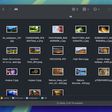Industry Group to Establish OpenCL Standard
The Khronos Group, a member-funded consortium focused on establishing open standard application programming interfaces (APIs), has announced the formation of the "Compute Working Group" to focus on open standards for parallel computing across graphics processing units (GPUs) and CPUs. Apple, AMD (ATI) and Nvidia are amongst the initial members.
The group will specifically evaluate and establish Apple's proposed Open Computing Language (OpenCL) specification. OpenCL aims "to enable any application to tap into the vast gigaflops of GPU and CPU resources through an approachable C-based language." The press release gives us a broader overview of what OpenCL is trying to accomplish:
A widely available open-standard compute programming specification with high-performance, general computation support and robust numerics will complement existing solutions and further liberate GPU-based compute power from the realm of graphics-only applications and provide a multi-vendor, portable interface for coordinating all the many-core GPUs and multi-core CPUs within a system. Such capability will have broad applicability - including a central role in the Khronos API ecosystem by providing a powerful compute front-end to OpenGL and OpenGL ES, and a platform for accelerating tasks such as physics and image processing / recognition.
The Khronos Group is also responsible for OpenGL and OpenGL ES standards as well as many others.
At WWDC, Apple first announced its plans to introduce performance enhancing technologies into their next version of Mac OS X (Snow Leopard). The technologies included "Grand Central" and "OpenCL" which promise to improve computer performance by taking advantage of modern multi-core processors as well as the GPUs found on modern video cards.
According to the president of the Khronos group, this technology could be used in both desktop and handheld devices in the future.
Popular Stories
iOS 19 will not be available on the iPhone XR, iPhone XS, or the iPhone XS Max, according a private account on social media site X that has accurately provided information on device compatibility in the past.
The iPhone XR, iPhone XS, and iPhone XS Max all have an A12 Bionic chip, so it looks like iOS 19 will discontinue support for that chip. All other iPhones that run iOS 18 are expected...
Apple today released iOS 18.4 and iPadOS 18.4, the fourth major updates to the iOS 18 and iPadOS 18 operating system updates that came out last year. iOS 18.4 and iPadOS 18.4 come two months after Apple released iOS 18.3 and iPadOS 18.3.
Subscribe to the MacRumors YouTube channel for more videos.
The new software can be downloaded on eligible iPhones and iPads over-the-air by going to...
Apple today released watchOS 11.4, the fourth major update to the operating system that runs on the Apple Watch. watchOS 11.4 is compatible with the Apple Watch Series 6 and later, all Apple Watch Ultra models, and the Apple Watch SE 2.
watchOS 11.4 can be downloaded on a connected iPhone by opening up the Apple Watch app and going to General > Software Update. To install the new software,...
Apple today released new firmware updates for all AirPods 4 and AirPods Pro 2 models. The new firmware is version 7E93, up from the 7B21 firmware that was installed on the AirPods Pro 2 and the 7B20 firmware available on the AirPods 4 and AirPods 4 with ANC.
It is not immediately clear what new features or changes are included in the new firmware, but we'll update this article should we find ...
While the iPhone 17 Pro and iPhone 17 Pro Max are not expected to launch until September, there are already plenty of rumors about the devices.
Below, we recap key changes rumored for the iPhone 17 Pro models as of March 2025:
Aluminum frame: iPhone 17 Pro models are rumored to have an aluminum frame, whereas the iPhone 15 Pro and iPhone 16 Pro models have a titanium frame, and the iPhone ...
Apple today released macOS Sequoia 15.4, the fourth major update to the macOS Sequoia operating system that launched in September. macOS Sequoia 15.4 comes two months after the launch of macOS Sequoia 15.3.
Mac users can download the macOS Sequoia update through the Software Update section of System Settings. It is available for free on all Macs able to run macOS 15.
With...




















